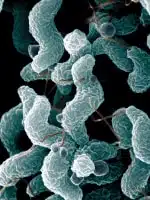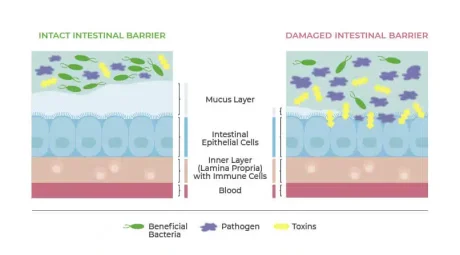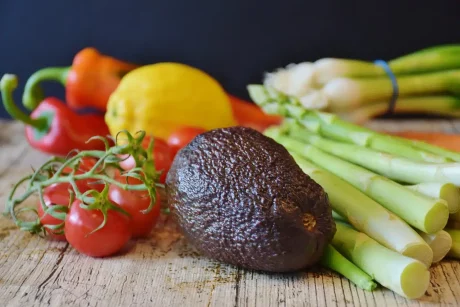
© 2023 House of Health. All rights reserved.
Web Design by Netbloom
Web Design by Netbloom
Have you heard of gut immunity? Did you know that most (about) 70-80% of your entire immune system is centred in your gastrointestinal tract1? But what drives this gut immunity? Let’s explore this topic more!

As you have probably heard, humans host a wide array of microorganisms that reside in the gut. What we are discovering is just how connected these microorganisms are with our immune system and its optimal function 1.
Microbiome is the term for the collective micro-ecosystem of organisms that line the entirely of our intestines and their genes. Some commonly known beneficial bacteria are the probiotics Lactobacillus acidophilus and Bifidobacterium bifidum 4.
The more beneficial bacteria in our microbiome, the less susceptible we are to invasion by pathogenic varieties. Our microbiome is more than just bacteria; fungi and viruses also co-exist within us. These, and many other microorganisms, are responsible for helping form and maintain the barrier that provides protection against potentially harmful organisms4.
This protection is enhanced by antimicrobial molecules called bacteriocins providing important defence against bacterial, viral, and fungal pathogens.
Gut microbes also produce short-chain fatty acids (SCFA) – fuel for intestinal cells, helping shape our immune responses – read more below 6.
Cells lining the intestine produce mucous, a slimy substance that protects the cells beneath it, as well as being “home” to our gut microbes 4. The mucous provides both physical and biochemical protection by inhibiting pathogenic microorganisms and helping block harmful or toxic substances from entering the bloodstream.
By protecting the underlying cells, important nutrients can pass through the mucosal wall and be absorbed into the body 7.
Beyond this layer of mucous is the intestinal epithelium, a lining that is made up of a single layer of cells, helping protect against infection and supporting digestion. Pathogens (or even potential pathogens) get trapped in this lining. Once trapped, they are transported for waste removal via the gut-based lymphatic (drainage) system 2 – see the image below.
You can see that damage to the lining of the intestines could be a major problem for your immune system. Learn more about this damage here.

Most of our immune system is in the gut. Special lymph tissue (commonly referred to as “GALT”). is found in three different segments of the gut lining – the epithelial layer (see above), the deeper layer (called lamina propria), and special follicles called Peyer’s patches.
GALT produces and hosts immune cells, monitors immunity, and controls what can or cannot pass through the intestines. This is where trapped pathogenic bacteria are stored and flagged for elimination 7. There is an impressive array of immune cells located here 3.
Thus, GALT is a very important gatekeeper, able to recognise and neutralise potentially harmful substances or pathogens substances, preventing them from entering the blood stream 8.
GALT and these intestinal immune cells interact with our microbiome. Both are directly influenced by the foods and lifestyle choices we (the host) adopt 7. Our gut microbiome and immune cells do best when we consume a healthy, balanced diet. But what does this look like exactly?
Let’s dive into the specifics of nutrition for gut immunity.
Including a diverse range of healthy wholefoods in your diet is the optimal foundation for supporting your microbiome and both its and your immune function.
It is proven that a poor diet, especially one lacking in fibre, is bad for your gut health. No surprise then that it may also contribute to a compromised immune system, leading to increased susceptibility to infections.
A diet rich in fruits and vegetables, whole grains (such as oats and quinoa), and fermented foods (such as kefir, sauerkraut, kimchi, and yoghurt), is recommended as these foods contain fibre, prebiotics, and probiotics to feed and replenish the beneficial bacteria in the gut 9, 10.
Use the table below as a guide for identifying specific nutrients involved in immune function, and the foods you can find them in 12-17.
| NUTRIENT | FUNCTION | FOOD SOURCES |
| Vitamin A | Aids in the development of white blood cells, which are important for healthy immune response and regulation. | Liver, eggs, dairy products, cod liver oil.* Kale, spinach, broccoli, red and yellow capsicum, carrots, orange kumara, tomatoes, and mango. |
| Vitamin B6 | Required in the metabolism of antibodies and cytokines in the immune system (produced by immune cells). | Potatoes, beans, beef, chicken, and fish. |
| Vitamin B9 | Used in the production of T lymphocytes, which protect the body from pathogens. | Beans, peas, lentils, spinach, asparagus, beets, broccoli, banana, berries, grapefruit. |
| Vitamin B12 | Required for the formation of new immune cells or antibodies. | Beef, poultry, fish, dairy, and eggs. |
| Vitamin C | Highly concentrated in neutrophils (the “first defender”) of your immune system. 17
Antioxidant |
Essentially all raw fruits and vegetables! Highest in red/yellow capsicum and kiwifruit. |
| Vitamin D | Regulates the inflammatory response and antibody production. | Milk, butter, salmon, sardines, egg yolks, mushrooms. |
| Zinc | Important for the production and function of immune cells. | Oysters, beef, pork, cheese, turkey, beans, pumpkin kernels, lentils. |
| Iron | Required for immune cells (T lymphocytes and cytokines), which protect the body from pathogens. | Beef, pork, poultry, lamb, liver, oysters, shrimp, chicken, duck, mackerel, trout, tuna. Also high in spinach, kale, parsley, but in a harder-to-absorb form. |
| Copper | Needed for energy production of immune cells. Also, protects against oxidative damage. | Shellfish, seeds, nuts, oysters, beef, and liver. |
| Selenium | Important to produce T cells, which protect the body from infections. | Oysters, liver, canned tuna, roasted pork, eggs, Brazil nuts. |
* Vitamin A is naturally found in some animal foods, and b-carotene, “provitamin A”, is found in plant foods. This must be converted to vitamin A in the body.
You can see that ensuring your diet contains a wide variety of fresh fruits, vegetables, wholegrains, and fermented foods, is critical to support your gut immunity – by helping your microbial community to thrive and contribute the normal function of your immune system.
Immune defence on your dinner plate!

Showing all 3 results





cauliflower & leek soup Craving a comforting homemade soup that’s both easy to prepare and bursting with flavour? Look no further than
House of Health Ltd
Some customers are experiencing glitches in the payment gateway but our IT folk are stumped. If this happens to you, we'd appreciate a screenshot or screen recording. Dismiss
Stay informed: Get expert tips, free advice, updates, recipes, and special offers delivered straight to your inbox.